On August 20, Verkhovna Rada adopted draft law No. 8371, enabling the prohibition of religious organizations associated with the Russian Federation, specifically targeting the Ukrainian Orthodox Church of Moscow Patriarchate (UOC-MP). On July 23, 2024, the draft law did not reach its second reading because it was not brought to a vote as deputies took a brake from their sessions. Against this backdrop, some Ukrainian MPs spread false information about the ban on the UOC-MP. What lies they are propagating is discussed in an article for the publication LB.UA.
Methodology
We decided to focus on those MPs who publicly opposed the ban on the UOC-MP. During monitoring, we considered statements from this year closest to the potential date of the law’s consideration. Most of the MPs who voted against the ban on August 20 or abstained did not publicly comment on the situation and were thus not included in the article.
The article examines statements made by Maksym Buzhanskyi (Servant of the People), Artem Dmytruk (parliamentary group Restoration of Ukraine), Yurii Boiko (group Platform for Life and Peace), and Yevhen Shevchenko (Restoration of Ukraine group).
Refutation: “There is no ‘Moscow Church’ in Ukraine”
A few months after Russia’s full-scale invasion, the UOC-MP attempted to formally distance itself from the Russian Orthodox Church (ROC). On May 27, 2022, all provisions hinting at or indicating connections with Moscow were removed from the Statute on the Governance of the Ukrainian Orthodox Church. The UOC declared full canonical “independence”. For some, including Maksym Buzhanskyi, this became grounds to claim that there is no Moscow Church in Ukraine anymore and that the state is oppressing its own believers.
Maksym Buzhanskyi, 21/05/2024
False
“Colleague Zhelezniak knows perfectly well that there is no Moscow Church or anything Moscow-related here at all, but there are several million citizens who are UOC parishioners, whom European Solidarity, Holos, and some of their partners in the Rada are trying to humiliate under the guise of war.”
However, the “separation” of churches occurred only on paper. In January 2023, a religious examination by the State Service for Ethnopolitics and Freedom of Conscience confirmed that the UOC-MP remains structurally part of the Russian Orthodox Church and has not broken its ecclesiastical and canonical ties with it.
State Service for Ethnopolitics and Freedom of Conscience specifically evaluated the status of the UOC as outlined in its Statute, noting that it is “independent and autonomous in its governance and structure according to the Letter of the Patriarch of Moscow and All Rus’ Alexey II dated October 27, 1990.” In fact, in Orthodox canonical law there are no concepts of “independent” and “self-governing”. According to church canons, there are only three statuses: exarchate (part of another church), autonomous church (retaining ties with a larger church, and autocephaly (independence). An independent church is only autocephalous when confirmed by a document from the Ecumenical Patriarchate — a tomos. Since the UOC-MP does not have a tomos, it remains a subordinate religious organization.
The Russian Orthodox Church Statute still defines the UOC as part of the Moscow Patriarchate — a structural subdivision.


Excerpts from the ROC Statute
In a section dedicated to the UOC, it is described as “self-governing with broad rights of autonomy”. Decisions of the ROC’s governing bodies remain binding for the UOC-MP. This section of the ROC Statute was not contested at the UOC Council on May 27, 2022. Furthermore, the day after the Council, Metropolitan Hilarion, head of the ROC’s Department for External Church Relations in Russia, stated that unity between the ROC and the UOC-MP remains intact, and the Council did not change anything. He claimed it only reaffirmed the status the church has had since 1990, when it received its self-governance charter.
Thus, renaming or formal changes to the Statute do not mean that the UOC has ceased being subordinate to Moscow.
Religious scholar Oleksandr Sahan, a member of the State Service for Ethnopolitics and Freedom of Conscience Expert Council, emphasizes the UOC’s subordination to Moscow. He adds that this church in Ukraine engages not in religious matters but in spreading the “Russian World”. At the same time, Sahan states that the goal of the state cannot be to ban a religious organization outright. He points to the need to depoliticize the activities of the church, which has historical ties to the Russian Federation, and to provide people with information about the church they attend. The expert believes that a significant part of the believers of the UOC-MP are unaware of its connection with the Russian Federation.
Journalistic investigations reveal that UOC representatives maintain ties with Russia. In 2023, Ukrainian Truth (Ukrainska Pravda) uncovered that UOC-MP leader Onufrii and several other clergy members held Russian citizenship. They also found that UOC representatives visited Russia after the full-scale invasion began. For instance, the abbot of the Desiatynnyi Monastery, Hedeon, was seen at a service on January 7, 2023, in the Cathedral of Kazan in the Republic of Tatarstan. He also holds Russian citizenship.
The OSINT community Molfar similarly points to UOC-MP ties with Russia. For example, Archbishop Varsonofiy holds Russian citizenship and is registered in a city in the Republic of Adygea. In 2023, he was deprived of his Ukrainian citizenship. Another example is Metropolitan Meletii, who opposed an independent Ukrainian church from the ROC and now resides in Russia.
Substitution of concepts: “Ban on Orthodox faith” instead of “ban on the UOC-MP”
The next argument following the denial of UOC-MP ties to Russia is: “Ukraine is planning to ban the Orthodox faith!” The claim suggests that the draft law not only bans legal entities but also violates freedom of religion. This narrative is promoted by Artem Dmytruk, who, notably, became a subdeacon of the UOC-MP earlier this year.
It is worth mentioning that in February 2024, Dmytruk posted bail for Pavlo Muzychuk, a UOC-MP hierodeacon suspected of justifying Russia’s armed aggression. Journalists from Bihus.Info also uncovered that Dmytruk had met with UOC-MP priest Serhii Chertylin, who is suspected of state treason, collaborationism, creating a criminal organization, inciting interfaith hostility, and justifying Russian aggression. According to messages released by journalists, after meeting with the MP, Chertylin wrote to Viktor Vyshnevetskyi — a Donetsk coal industry businessman from the Yanukovych era. Chertylin reported that Dmytruk was “ready for full cooperation” and “grateful for the legal analysis regarding draft law No. 8371, with which we managed to persuade some MPs”.
Artem Dmytruk, 11/08/2024
False
“After all, banning the Church is not just banning legal organizations. First and foremost, it is a ban on individuals professing the Orthodox faith and calling themselves believers of the Orthodox Church!”
In reality, draft law No. 8371 does not propose any changes to the freedom of religion for Ukrainians. Instead, it seeks to prevent the operation of pro-Russian religious organizations. Initially, religious organizations suspected of cooperating with the Russian Church will be reviewed by the State Service for Ethnopolitics and Freedom of Conscience Expert Commission. Experts will primarily examine connections to the Russian Church (the governing center cannot be located in Russia) and the dissemination of Russian ideology. In addition to religious studies expertise, public electronic registries, information from other executive bodies, individuals, legal entities, and media may be used.
If violations are found, the organization will have up to two months to address them. If the violations are not corrected, State Service for Ethnopolitics and Freedom of Conscience will file a lawsuit against the organization.
At the same time, Ukrainians are not restricted in their choice of faith or the churches they attend. The draft law does not propose changes to Article 3 (Right to Freedom of Conscience) of the Law “On Freedom of Conscience and Religious Organizations”. Furthermore, the constitutional right to freedom of religion remains unchanged, and the Constitution cannot be amended during martial law.
“Illegal arrests and searches”
News of searches in churches, arrests of clergy, termination of lease agreements for churches, evictions of the UOC-MP, or transitions of communities to the OCU are often accompanied by claims that such actions are illegal and anti-democratic.
Artem Dmytruk, 22/05/2024
False
“The initiative to ban the Church has an anti-democratic nature and solely aims to divide society along religious lines… The actions of the Church’s persecutors have only provoked numerous conflicts within our state: illegal seizures of churches, arrests of hierarchs, clergy, human rights defenders, journalists, and ordinary believers.”
Dmytruk has consistently opposed the ban on the UOC-MP and the decision to evict the organization from the Holy Dormition Pochaiiv Lavra in the Ternopil region.
Artem Dmytruk, 26/05/2024
False
“In simple terms — soon we will witness the illegal raider seizure of one of Ukraine’s greatest Orthodox shrines. Clearly, under the pretext of ‘inspections,’ the Church’s persecutors are preparing another attack on the monastery and its property, without hesitating to desecrate sacred places. If the Pochaiiv Lavra is taken from the UOC, it will face the same fate as the Kyiv-Pechersk Lavra, which was partially seized a year ago and practically handed over to the state religious organization.”
These claims, however, are untrue. First, Ukrainian law does not impose penalties for practicing a particular religion or being part of a specific religious organization. Clergy or believers of various denominations are not arrested solely for belonging to the UOC-MP. Arrests occur only when laws are violated. Since the beginning of the full-scale war, as of August 2024, the Security Service of Ukraine has initiated over 100 criminal cases against UOC-MP clergy, most of whom are accused of collaborationism, treason, aiding the aggressor state, and justifying Russia’s aggression. There have been no reported cases of journalists supporting the UOC-MP being detained or censored.
Second, decisions to evict UOC-MP communities from certain churches are neither “anti-democratic” nor “illegal”. The UOC-MP rents churches from the state or private entities. Lessors can independently decide to renew or terminate lease agreements. For example, in March 2023, the National Reserve “Kyiv-Pechersk Lavra” terminated the UOC-MP’s lease of the Lower Lavra. This decision was based on a report by the State Audit Service, which revealed unauthorized construction and leasing of cultural heritage sites to third parties.
In November 2022, the Security Service of Ukraine conducted searches at the Kyiv-Pechersk Lavra and found Russian rubles and pro-Russian literature used in seminary and parish school curricula.
The UOC-MP filed a lawsuit, but in June 2023, the Kyiv Commercial Court ruled that the 2016 lease agreement had not been renewed in 2023. As a result, the UOC-MP lost the right to use the Dormition Cathedral and Refectory Church and was required to vacate the premises. The organization appealed, and as of the time of writing, the court process is ongoing.
In July 2023, the religious organization filed an appeal. The appellate proceedings were initiated only in September of the same year, and as of the time of writing, the court process is ongoing. In August of the same year, the Kyiv Commercial Court ruled that the termination of the lease agreement between the UOC-MP and the National Reserve “Kyiv-Pechersk Lavra” was entirely lawful.
Thus, there was no “raider seizure”. However, some UOC-MP priests and monks, despite numerous court rulings, continue to reside on the Lavra’s premises and conduct services. The UOC-MP brotherhood was supposed to vacate the Lavra premises by March 29, 2023, following the termination of the lease agreement with the reserve. However, the UOC-MP is currently awaiting the appellate court’s decision. The organization had previously announced that they would not vacate the Lavra until the court proceedings concluded.
In the case of the Holy Dormition Pochaiv Lavra in Ternopil Oblast, there is still no definitive decision regarding its future. The Lavra consists of 18 structures, 6 of which are managed by the Kremenets-Pochaiv Historical and Architectural Reserve. The remaining buildings were transferred to the UOC-MP for free use under a lease agreement valid until 2052.
In March 2023, the then-Minister of Culture, Oleksandr Tkachenko, stated that the lease agreement for one of the churches (without specifying which) used by the UOC-MP in the Pochaiv Lavra had expired. In November 2023, the Security Service of Ukraine conducted searches on the territory of the Pochaiv Lavra. Investigators found that UOC-MP representatives had published posts on the monastery’s website inciting interethnic hatred and hostility, as well as questioning Ukraine’s existence as separate from Russia.
In June 2024, the Ministry of Culture conducted an inspection of the state of preservation of state property. The commission discovered numerous violations, including the disappearance of icons from the churches and non-compliance with fire safety regulations. Additionally, the commission reported the construction of unauthorized buildings and extensions, as well as restoration work carried out without the necessary permits and scientific expertise, which led to the loss of authentic elements of the heritage sites and increased strain on the original structures. Currently, there is no final decision on terminating the lease agreement between the UOC-MP and the Kremenets-Pochaiv Historical and Architectural Reserve.
Meanwhile, in March 2023, the Orthodox Church of Ukraine (OCU) established the religious organization “Pochaiv Holy Dormition Lavra of the Ternopil Diocese of the OCU”. Although de jure the Lavra is still under UOC-MP control through the lease agreement, Metropolitan Nestor of Ternopil and Kremenets explained that the creation of the religious organization would not lead to the immediate transfer of all monastery premises to the OCU. “But this decision means that we declare our participation in this process and are ready to begin the documentation process now,” he explained. Additionally, the OCU Primate, Metropolitan Epiphanius, noted in January 2024 that the establishment of a religious organization on the Lavra’s territory would facilitate a gradual yet peaceful process of transferring churches from the UOC-MP to the OCU.
Appeal to numbers: “Millions of UOC-MP parishioners”
For many years, the UOC-MP has positioned itself as a religious center with “millions of believers” in Ukraine. Political figures (Yurii Boiko and Artem Dmytruk) actively support this narrative as an argument against banning the UOC-MP in Ukraine, claiming such a ban represents “repression against millions of compatriots”.
Yurii Boiko, 02/05/2024
No verdict
“Unfortunately, we continue to witness sad events in our country. It’s not just the war and the suffering of people but also the suffering brought to clergymen through searches, arrests, and attempts to discredit the Ukrainian Orthodox Church, which has millions of parishioners, including those fighting on the frontlines.”
Artem Dmytruk, 02/08/2024
No verdict
“Without a doubt, these are enemies of our country. Their so-called ‘patriotic’ actions are always accompanied not only by anti-religious but also anti-state messages. What kind of patriotism can there be if they aim to drive at least 6 million Ukrainian citizens underground?”
We requested comments from the State Service for Ethnopolitics and Freedom of Conscience, which clarified that Ukrainian legislation does not provide for the official registration of believers. We also sent inquiries to the UOC-MP and the OCU, but no responses were received.
Instead, State Service for Ethnopolitics and Freedom of Conscience provides statistics on the number of religious communities. A religious community is a religious organization of believers who voluntarily unite to meet religious needs, most of which have the status of legal entities. As of January 1, 2024, Ukraine had 8,295 registered OCU communities and 10,919 UOC-MP communities.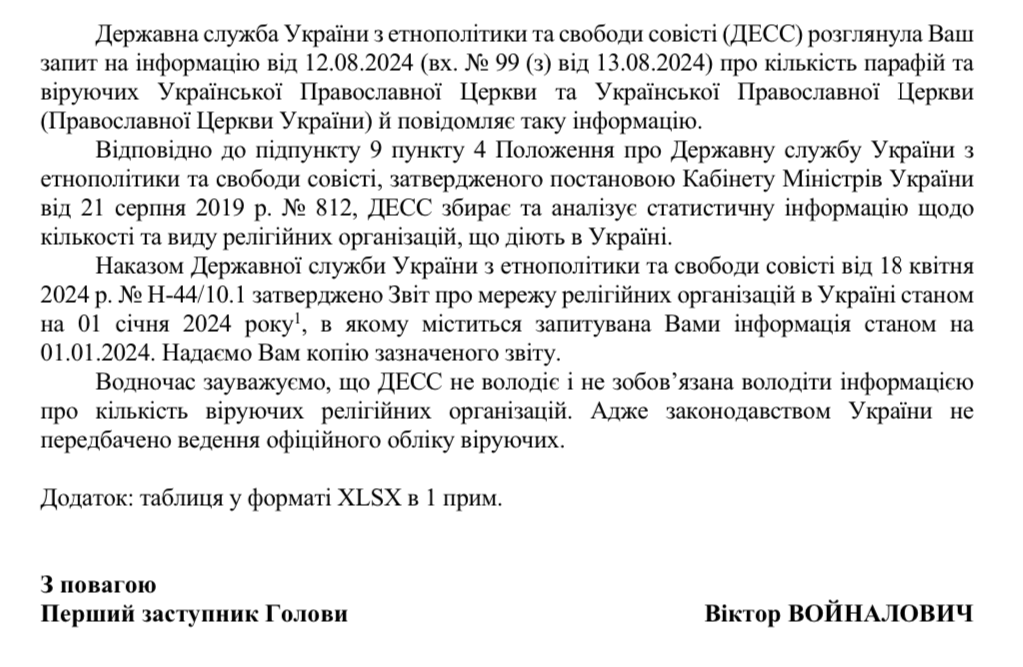
Response of State Service for Ethnopolitics and Freedom of Conscience to VoxCheck request
There are also sociological surveys on religious identification. However, sociology can show social trends but cannot provide an exact count of parishioners in a particular denomination. In 2022, the Kyiv International Institute of Sociology (KIIS) conducted a survey of 2,000 respondents. According to the results, 54% of Ukrainians identify with the Orthodox Church of Ukraine, while only 4% identify with the Ukrainian Orthodox Church of the Moscow Patriarchate. An additional 14% identified as supporters of Orthodoxy without specifying a patriarchate.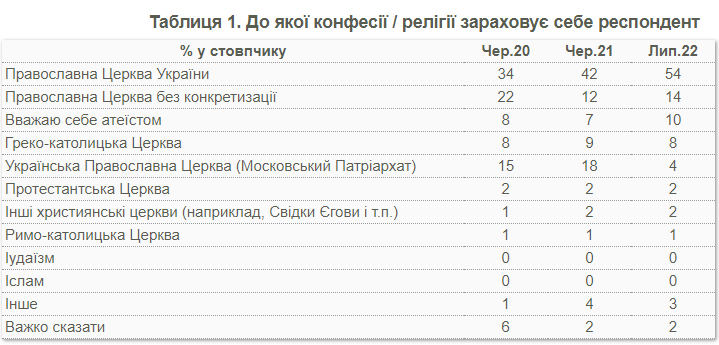
KIIS Survey, 2022
The 2022 Razumkov Center survey revealed that formal affiliation with a particular church does not always correspond to membership in a specific religious community (parish). For example, 70% of Protestant and Evangelical church faithful reported community membership, as did 58.5% of UGCC faithful, 41% of UOC-MP faithful, and 30% of OCU faithful.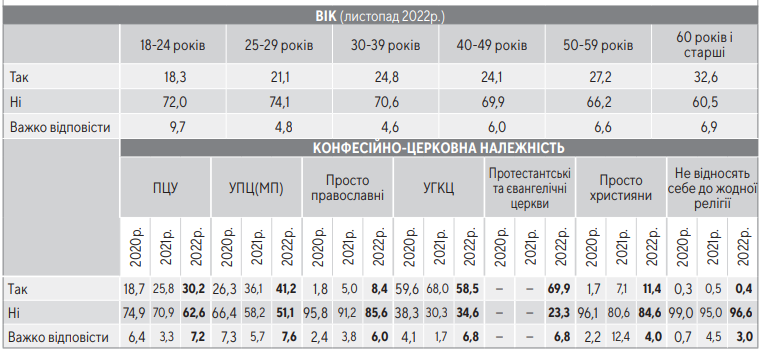
Razumkov Center survey, 2022
The Razumkov Center survey of 2023 confirmed a declining trend in UOC-MP supporters. While 13% of respondents identified with the church in 2021, this dropped to 5.6% in 2023.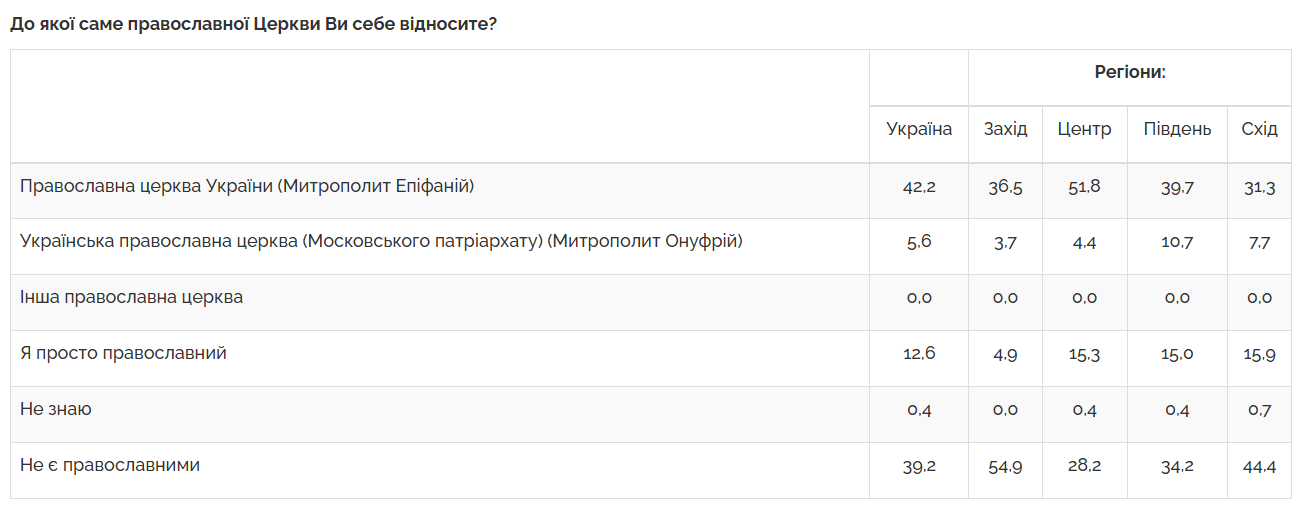
Razumkov Center Survey, 2023
Accusations of collaboration with Russia during its full-scale invasion of Ukraine have undermined Ukrainians’ trust in this religious organization. In particular, a KIIS survey on government policies and trust in the UOC-MP conducted in April 2024 showed that 83% of respondents believe the state should intervene in the UOC-MP’s activities to some extent. Furthermore, 63% are convinced that the UOC-MP should be completely banned in Ukraine, while another 20% support state oversight and control but not a total ban.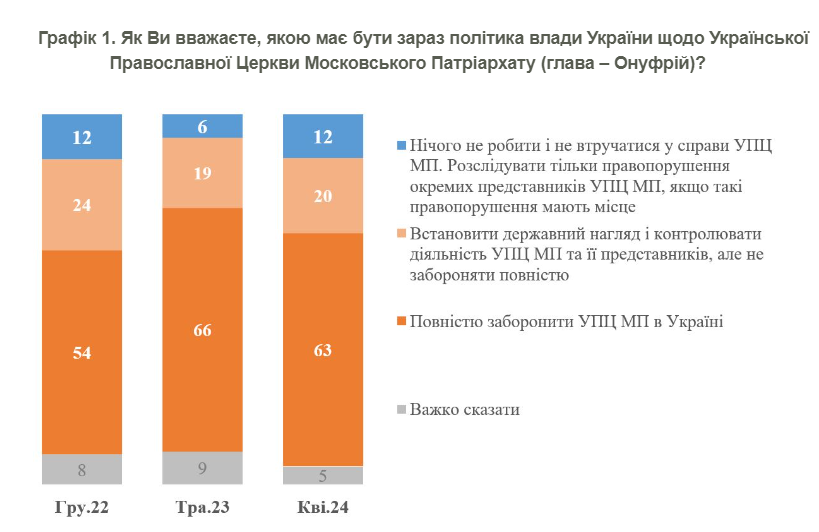
KIIS survey results screenshot
We leave Boiko and Dmytruk’s statements without a verdict. The deputies provide no evidence to support their claims of 6 million parishioners, and there is no official data on the number of believers to refute or confirm this figure.
Appeal to international partners
In attempts to maintain the position of the UOC-MP and prevent its outright ban, Ukrainian parliamentarians are seeking support from international partners. For instance, Artem Dmytruk quoted the opinion of U.S. Republican Senator Randal Howard Paul.
Artem Dmytruk, 18/07/2024
False
“U.S. Senator Randal Howard Paul: ‘In Ukraine, political parties are being banned, churches seized, and priests arrested. So no, this is not a democracy, it’s a corrupt regime.”
Who is this American politician, and what is he known for during Russia’s full-scale invasion of Ukraine? Randal Paul is a Republican senator from Kentucky who has repeatedly blocked aid packages for Ukraine in Congress, urged Ukraine to negotiate with Russia to obtain neutral status, labeled Ukraine as “one of the most corrupt countries in the world,” and accused the Biden administration of “escalation”. Notably, in several articles and speeches, including in 2024, Senator Paul referred to Ukraine’s capital using the Russian spelling “Kiev”.
It is therefore unsurprising that Howard Paul has now spoken in defense of the pro-Russian church in Ukraine. However, it is evident that Ukrainian deputies’ attempts to appeal to such politicians are unlikely to succeed. Regardless of the UOC-MP ban, these politicians have previously opposed Ukraine for other reasons.
Artem Dmytruk also claims that banning the UOC-MP would deteriorate Ukraine’s relations with European and American partners.
Artem Dmytruk, 31/07/2024
No verdict
“The adoption of the bill banning the UOC, initiated and lobbied by persecutors of the Church, will put an end to our relations with European and American partners”.
However, it remains unclear what position each partner state holds regarding the UOC-MP ban. For example, the U.S. Department of State annually publishes reports on religious freedom in various countries, including Ukraine. The latest 2023 report mentions Bill No. 8371 and cases initiated against pro-Russian priests but does not include any condemnation. On the contrary, the U.S. emphasizes Russian crimes, such as the destruction of churches in both occupied and Ukraine-controlled territories.
The UN holds a somewhat ambiguous stance: it does not explicitly oppose the bill but emphasizes the need to protect the rights of UOC-MP clergy and believers.
In 2023, during one session, Ilze Brands Kehris, Assistant Secretary-General for Human Rights at the Office of the UN High Commissioner for Human Rights (OHCHR), called for full freedom of religion or belief. Regarding the bill to ban religious organizations associated with Russia, she stated that lawmakers must clearly define the legitimate goal of the proposed restrictions, ensure their necessity and proportionality, and amend the bill text accordingly.
The latest UN report on human rights in Ukraine (December 1, 2023 – February 29, 2024) notes that UOC-MP priests and believers faced intimidation during the reporting period. However, this did not come from the state or law enforcement but from individuals or groups. OHCHR documented six incidents in five regions where groups forcibly entered UOC-MP churches, justifying their actions with local government decisions to register new OCU communities at addresses already registered to UOC communities.
Meanwhile, representatives of other international organizations (EU, OSCE, etc.) have not commented on the UOC-MP ban. The Parliamentary Assembly of the Council of Europe has recognized the Russian Orthodox Church as a tool of Russian influence and propaganda, unrelated to freedom of religion or expression. Some governments (Canada, the United Kingdom, the Czech Republic) have imposed sanctions against Russian Patriarch Kirill.
Thus, Artem Dmytruk’s assertion about the potential deterioration of relations with key partners remains without a verdict. International organizations and individual states are currently focused on investigating Russian crimes. None of Ukraine’s partners have claimed that Ukraine is violating religious freedom or that international support will cease if the UOC-MP is banned. However, not all partners have commented on Bill No. 8371, making it impossible to fully understand their positions.
Inappropriate historical parallels
Supporters of the Ukrainian Orthodox Church (UOC) attempt to portray anyone advocating for the ban of their religious organization in a negative light. For instance, Yevhenii Shevchenko implied that activists opposing the UOC are worse than the Bolsheviks.
Yevhenii Shevchenko, 17/05/2024
Manipulation
“Pope Francis III emphasized that the Church is our mother because it gave us birth through Baptism. We are not orphans; the Church is our mother! How can one raise a hand against their mother? Even the Bolsheviks understood this. They stopped in time. What are you doing? What harm did the church cause you?“
However, such comparisons are manipulative. The Bolsheviks, from the outset, were hostile to religion and aimed to destroy it. After occupying Ukraine in the 1920s, Soviet authorities conducted anti-religious propaganda and later adopted harsh measures: plundering churches, repressing clergy, and intimidating believers. A special commission was even created to ‘develop methods to achieve these goals’.
This suppression targeted not just specific religious movements but all religions — Christianity, paganism — everything was banned. Notably, the Russian Orthodox Church was the first to face repression in 1917, losing its lands and property to the Bolsheviks. In 1930, the Ukrainian Autocephalous Orthodox Church was also liquidated.
At times, the fight against religion reached absurd levels. For example, on January 16, 1918, a public tribunal in Moscow “tried” God for “crimes against humanity and mass genocide.” After lengthy debates, the defendant was found guilty and sentenced to execution. The next day, the sentence was “carried out” by firing shots into the sky.
In subsequent years, the situation did not improve. Clergy were sent to labor camps, and executed, churches were closed, destroyed, or repurposed as grain storage or clubs. During the height of Stalinist repressions from August to November 1937, 166 Russian Orthodox Church bishops were arrested across the USSR, 81 of whom were executed. In Ukraine, between 1933 and 1936, approximately 75-80% of Orthodox churches ceased to exist. By 1936, there were over 12,000 Orthodox churches in Ukraine, but by 1939, fewer than 4,500 remained, and only about 1,000 were active.
In the 1940s, Stalin did liberalize the state’s attitude toward the Church. According to historian Oleksandr Lysenko, this decision was influenced by several factors: a turning point on the Eastern Front during World War II, the opening of the Western Front by the Allies, and the Russian Orthodox Church’s demonstrated loyalty to the Soviet regime. “Contacts with Western allies, particularly the Anglican Church in Great Britain, ultimately convinced Stalin that religion could be used not only as a factor compelling certain actions but also as a favorable tool for domestic and foreign political purposes,” Lysenko explained.
However, this occurred only after thousands of clergy and believers across the country had been tortured.
Given the above-mentioned crimes committed by the Soviet authorities against believers and clergy, it becomes evident that comparing the Bolsheviks with those advocating for a ban on the UOC is inappropriate. Ukraine operates under Article 35 of its Constitution, which guarantees everyone the right to freedom of belief and religion. This right allows individuals to practice any religion, as further supported by the Law of Ukraine “On Freedom of Conscience and Religious Organizations.”
In Ukraine, UOC clergy are not persecuted or punished unless they violate the Administrative or Criminal Code. Ukrainian authorities do not demolish churches where UOC services are held; instead, they terminate or do not renew lease agreements with them.
Victim blaming and intimidation with escalation
Victim blaming is a term that refers to the act of the aggressor blaming the victim. This is often used by Russia, especially after large-scale shelling in Ukraine. The narrative is often, “You shouldn’t have provoked, then the shelling wouldn’t have happened”. In one of his messages, Yevheniy Shevchenko provided a clear example of victim blaming.
Yevhenii Shevchenko, 21/05/2024
False
“If the law is passed, it will serve as an additional incentive for the mobilization of the Russian community against our country. Every day, we are looking for ways and methods to mobilize our society against Russian aggression. Because there are not enough people at the front. And this is an objective factor. And here, right, bluntly, and mercilessly, Poroshenko and his supporters in parliament are making such a gift to Putin and the Kremlin. They won’t even need to do much. This ban on the UOC will be broadcast on all Russian channels. And as a result of our political imprudent action, their mobilization resources will grow.“
Such statements from Shevchenko aim not only to sow hostility towards those who vote for the UOC ban but also to instill fear in ordinary Ukrainians. As if Ukraine “definitely shouldn’t” ban a church (whose representatives fully support Russia), because in doing so, “we’ll bring disaster upon ourselves”.
The Russian army’s offensive and its mobilization resources do not depend on the adoption of the law banning the UOC MP. Indeed, propagandists will use this as an excuse for war crimes on their television. However, it will only be an excuse and cover-up, not the actual cause of the offensive.
Russia’s goal is to destroy and occupy Ukraine. For example, on July 10, 2024, Dmitry Medvedev directly stated that Russia would seize all of Ukraine even after signing a “peace treaty”. Meanwhile, Russia continues to attack not only with rhetoric but also with weapons: actively advancing in the East, destroying Ukrainian cities with artillery, missile, and air strikes.
The Russian Federation’s mobilization plans do not depend on the UOC MP ban. According to Deputy Minister of Defense Ivan Havryliuk, the occupiers are increasing their presence in the occupied territories: at the beginning of the year, the group consisted of 440,000 soldiers; now it is 600,000, and by the end of the year, it may reach 800,000. The head of the Ministry of Defense’s Main Intelligence Directorate, Kyrylo Budanov, predicts that due to losses, the enemy will face a dilemma by the summer of 2025: either stop the war or conduct a new wave of large-scale mobilization. Moreover, there remains the risk of mobilization in temporarily occupied territories of Ukraine.
So no, Russia can conduct a new mobilization in case of a difficult situation at the front, and not because of imaginary “red lines”, like the ban on a pro-Russian church. As the practice of full-scale war shows, “red lines” are merely a method of intimidation: Moscow first threatens massive escalation, and then, after the lines are crossed, it submits and invents new boundaries after which it “will definitely” immediately destroy Ukraine. If we follow Shevchenko’s logic, Ukraine shouldn’t have taken any steps to combat Russia at all — whether reforms for integration into the EU and NATO, supporting the defense sector, or developing Ukrainian culture. After all, this “angers” the aggressor and will lead to escalation (which, in reality, will not happen).
Conclusions
Bill No. 8371 has been voted on in parliament, and the next steps are the president’s signature and its entry into force 30 days after publication. According to Speaker of the Parliament Ruslan Stefanchuk, Ukrainian religious organizations will have approximately 9 months to sever ties with Moscow, if such ties exist. This period accounts for the legislative implementation phase (one month for the law to come into effect, several months to develop additional regulatory frameworks, etc.).
Additionally, the decision to ban the pro-Russian church may be challenged in court. Therefore, even after the bill is passed, the wave of disinformation is unlikely to stop immediately — it will at least continue until the completion of the judicial proceedings. The core of the information campaign will consist of the same claims described above:
- denial of the existence of a church in Ukraine directly connected to Russia;
- claims that banning the UOC MP means banning the Orthodox faith;
- fakes about pro-Russian priests, “who are being detained only for professing Orthodoxy”;
- groundless assertions that a significant portion of Ukrainians support the UOC MP, and therefore will suffer from its ban;
- intimidation of Ukrainians: allegedly, the ban on the UOC will worsen relations with international partners, and for Russia, this will provide a reason for escalation in the war.
The main problem for Ukrainians is that fakes and manipulations are not only being broadcast in Russian media but also in the Ukrainian parliament. This is particularly critical under martial law when parliamentary elections cannot be held. Therefore, fact-checking of Ukrainian politicians remains relevant.
Attention
The authors do not work for, consult to, own shares in or receive funding from any company or organization that would benefit from this article, and have no relevant affiliations


